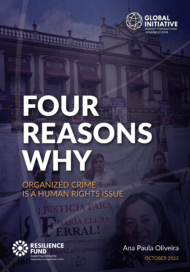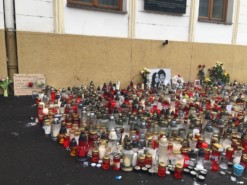Posted on 04 Sep 2020
The controversial acquittal of two defendants accused of orchestrating the murder of investigative journalist Ján Kuciak has sent shockwaves through Slovakia, a country grappling with corruption and organized crime. Many claim that justice has not been served.
The trial of the murder of Slovakian investigative journalists Ján Kuciak and his fiancée Martina Kušnírová came to an end on 3 September 2020 with the acquittal of two people accused of orchestrating the killings. The Slovakia Specialized Criminal Court cleared Marian Kočner, a prominent Slovakian businessman charged of masterminding the hit, and co-defendant Alena Zsuzsová, accused of mediated the murder, after finding that there was insufficient evidence.
The trial has been the subject of intense public scrutiny in Slovakia and worldwide and was widely seen as a crucial test of the country’s judiciary, which has long been mistrusted. In the context of widespread public anger at institutional corruption, the verdict will likely prove deeply controversial.
The assassination of the 27-year-old journalist and his fiancée in February 2018 shocked Slovakia and raised concerns about the threat to freedom of expression in the country. At the time of his death, Kuciak was investigating the influence of the Italian mafia in Slovakia and had unveiled financial crimes schemes, including tax fraud, involving prominent businesspeople (including Kočner) and members of the SMER–SD, the ruling party at time. Authorities indicated that the hit on Kuciak had been ordered due to his exposure of government corruption and the influence of organized crime.
The murders sparked the biggest demonstration in Slovakia since the 1989 Velvet Revolution, with protesters demanding justice for Kuciak and an end to corruption. The political crisis led to the resignation of several high-level officials, including Prime Minister Robert Fico. More than 200 people were questioned during the course of the investigation, but many feared that the murders would remain unsolved, echoing the case of former police officer Róbert Remiáš, who was killed in 1996 when his car exploded.
The case finally came to trial in January 2020. At the centre was Marian Kočner, the businessman accused of masterminding the assassination. (Kočner was in fact already in custody when the trial began, having been sentenced to 19 years in prison in February 2020 for forging promissory notes in his attempt to take over national broadcaster TV Markíza.) As the trial progressed, the extent of Kočner’s influential network came to light. Messages leaked to the media suggested that Kočner had regularly met with Fico, while the exposure of the businessman’s connections to ministers, police and judges led to new charges of bribery being brought against Kočner. The court also heard how Kočner resorted to threats and intimidation.
The prosecution also presented confessions of those accused of involvement in the crime, some of which appeared to shed light on the roles played by Kočner and Zsuzsová. After agreeing a plea deal in late 2019 that saw him receive a 15-year prison sentence, Zoltán Andruskó, a local pizzeria operator, confessed to having passed the order for the hit from Zsuzsová to the hitmen. Meanwhile, an ex-agent of the Slovak Information Service intelligence agency, Peter Tóth, testified that Kočner had ordered him to covertly monitor several journalists, including Kuciak.
Regional bodies also contributed their resources in support of the state’s case. Europol and Interpol extracted data from 12 devices, including Kočner’s and Zsuzsová’s mobile phones. Texts encrypted via the Threema app from Kočner’s mobile phone revealed a conversation between him and Zsuzsová that the prosecution argued was proof of their involvement in the murder.
After considering the case, the panel of judges found both Kočner and Zsuzsová not guilty due to insufficient evidence. Tomáš Szabó, also on trial and charged with carrying out the murder, was found guilty and sentenced to 25 years in prison.
For many in the courtroom and beyond, the verdict was an unexpected and devastating blow. Kuciak’s parents left the court before the entire verdict was read, while President Zuzana Čaputová told media that she was shocked by the verdict, although she accepted the court’s decision.
Aside from the domestic implications, the court’s verdict also represents a significant setback to those fighting against impunity for crimes against journalists. Investigating organized crime is one of the most dangerous activities in the world, and assassinations are frequently used by organized crime and corrupt networks to silence those reporting against them. In 2019, UNESCO reported that the rate of impunity for murders committed against journalists worldwide since 2006 was almost 90%. While there are instances of those who kill journalists being brought to justice, it is rare for those behind the scenes to be convicted. The international community can help combat this problem by raising the costs for governments that do not take action in cases of violence against journalists.
In Slovakia, the threat to journalists has not gone away, despite the public attention paid to the Kuciak case. In June, a bullet was found in the mailbox of a journalist at Aktuality.sk, where Kuciak worked before he was killed. Whether the Kuciak verdict will further embolden criminals to target investigative journalists remains to be seen: while the case has shown that those directly involved in carrying out the murder can and are being held to account, it is likely that those behind the scenes will feel empowered to operate with relative impunity.
How the verdict plays out in Slovakia over the coming weeks and months remains to be seen. For some, however, the fight for justice will continue regardless of the court’s decision. In a social-media post, Peter Bárdy, editor-in-chief of Aktuality.sk and Kuciak’s former employer, said: ‘I am very disappointed and sad …. [but] we will not resign! This is not the end, we are not even close to it. I am convinced that Kočner had Ján Kuciak murdered! #allforjan’.
Listen to the Faces of Assassination podcast episode dedicated to journalists. In this episode, we talk to journalists and press freedom campaigners about how organized crime networks are a threat to journalism: ‘Doing journalism shouldn’t be a death sentence.’




